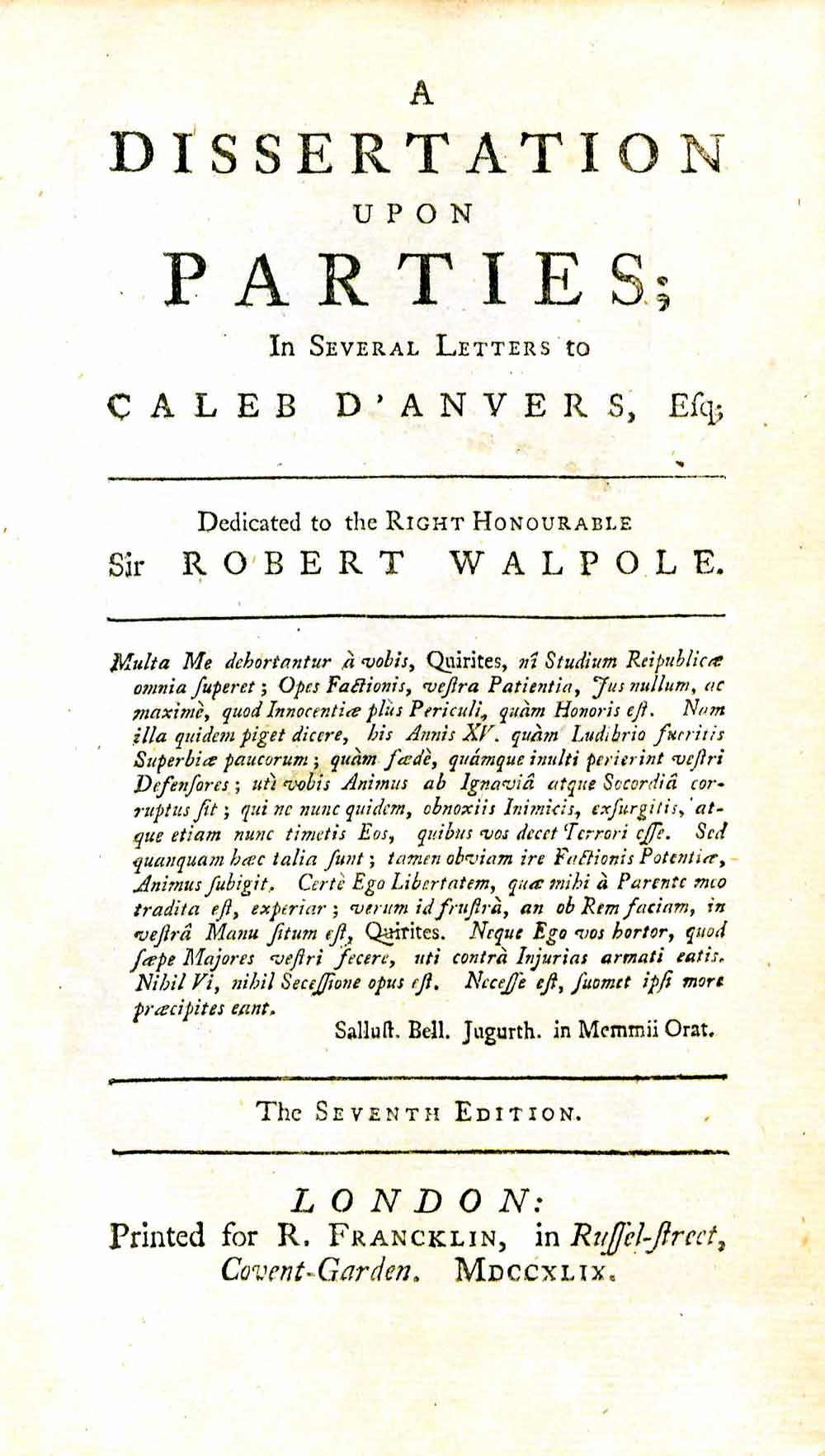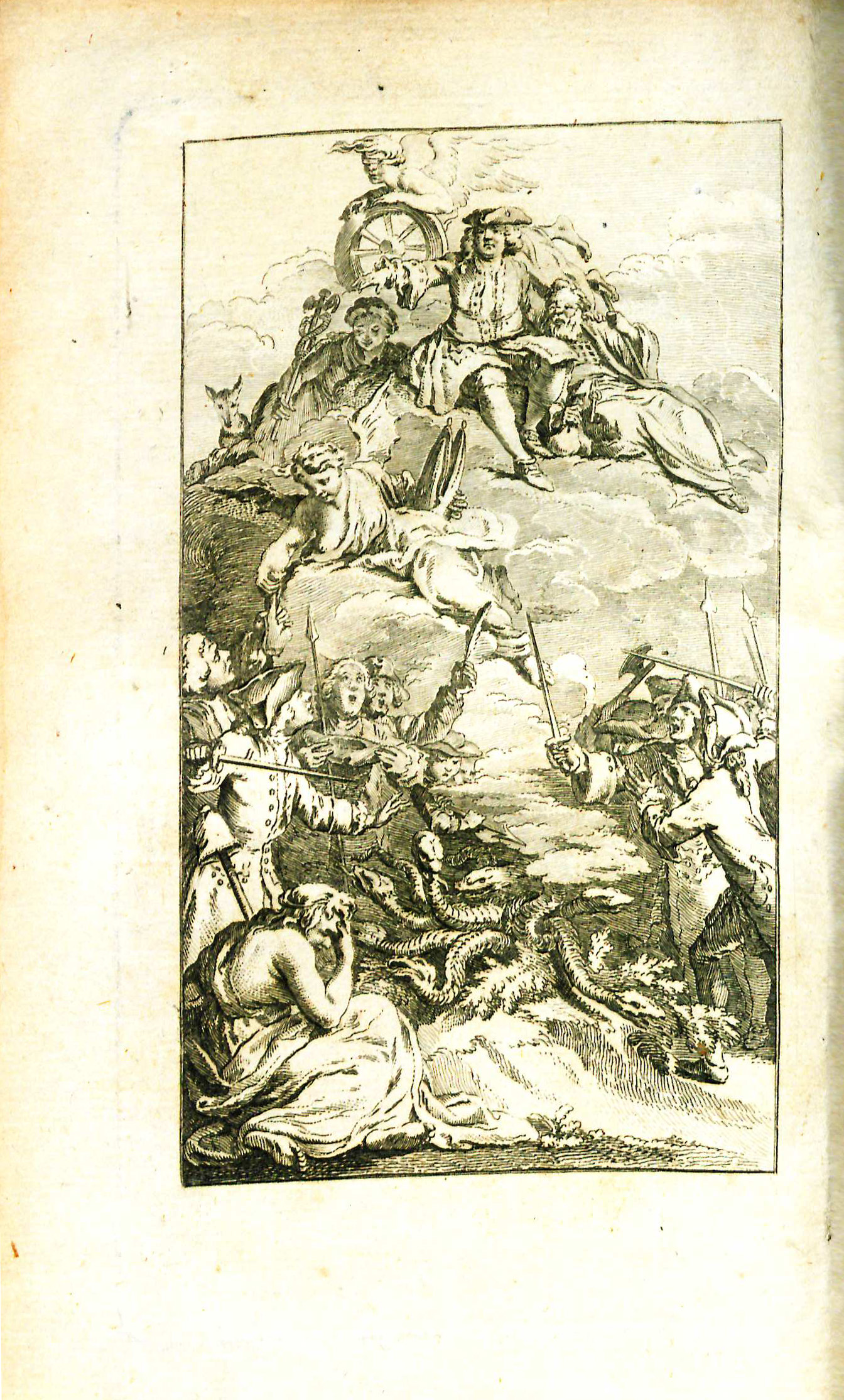Difference between revisions of "Dissertation Upon Parties"
(shelf) |
|||
| Line 14: | Line 14: | ||
|pages=xxxix, 322, [1] leaf of plates | |pages=xxxix, 322, [1] leaf of plates | ||
|desc=8vo (21 cm.) | |desc=8vo (21 cm.) | ||
| + | |shelf=B-1 | ||
}}[[File:BolingbrokeDissertationUponParties1749Frontispiece.jpg|left|thumb|250px|<center>Frontispiece.</center>]]''A Dissertation upon Parties'' was originally published in 1733 in the form of nineteen letters. It was notable for its sustained attack on the policies of [http://en.wikipedia.org/wiki/Robert_Walpole Robert Walpole], commonly considered the first prime minister of England, and in its calls for leaders of the Whigs and Tories (England’s two leading political parties at the time) to work together in an effort to renew constitutional safeguards weakened due to corruption within the British government.<ref>Caroline Robbins, “‘Discordant Parties’: A Study of the Acceptance of Party Englishmen,” ''Political Science Quarterly'' 73 (1958): 505-529.</ref> It was written by [http://en.wikipedia.org/wiki/Henry_St_John,_1st_Viscount_Bolingbroke Henry St John, 1st Viscount Bolingbroke] (1678–1751), a leader of the Tories and renowned English politician and political philosopher.<ref>H. T. Dickinson, "[http://www.oxforddnb.com/view/article/24496 St John, Henry, styled first Viscount Bolingbroke (1678–1751)]" in ''Oxford Dictionary of National Biography'', accessed October 11, 2013.</ref><br /> | }}[[File:BolingbrokeDissertationUponParties1749Frontispiece.jpg|left|thumb|250px|<center>Frontispiece.</center>]]''A Dissertation upon Parties'' was originally published in 1733 in the form of nineteen letters. It was notable for its sustained attack on the policies of [http://en.wikipedia.org/wiki/Robert_Walpole Robert Walpole], commonly considered the first prime minister of England, and in its calls for leaders of the Whigs and Tories (England’s two leading political parties at the time) to work together in an effort to renew constitutional safeguards weakened due to corruption within the British government.<ref>Caroline Robbins, “‘Discordant Parties’: A Study of the Acceptance of Party Englishmen,” ''Political Science Quarterly'' 73 (1958): 505-529.</ref> It was written by [http://en.wikipedia.org/wiki/Henry_St_John,_1st_Viscount_Bolingbroke Henry St John, 1st Viscount Bolingbroke] (1678–1751), a leader of the Tories and renowned English politician and political philosopher.<ref>H. T. Dickinson, "[http://www.oxforddnb.com/view/article/24496 St John, Henry, styled first Viscount Bolingbroke (1678–1751)]" in ''Oxford Dictionary of National Biography'', accessed October 11, 2013.</ref><br /> | ||
<br /> | <br /> | ||
Revision as of 20:59, 28 June 2015
by Henry St. John Bolingbroke
| A Dissertation Upon Parties | |
|
Title page from A Dissertation Upon Parties, George Wythe Collection, Wolf Law Library, College of William & Mary. | |
| Author | Henry St. John, Viscount Bolingbroke |
| Published | London: Printed for R. Francklin |
| Date | 1749 |
| Edition | Seventh |
| Language | English |
| Pages | xxxix, 322, [1] leaf of plates |
| Desc. | 8vo (21 cm.) |
| Location | Shelf B-1 |
Becoming a Member of Parliament in 1701, Bolingbroke subsequently served in the positions of Secretary of War and Secretary of State of both the Northern and Southern Departments.[3] Bolingbroke was forced to flee to Paris in 1715 after being charged with treason for supporting the Jacobite rebellion that sought to overthrow King George I, but he was pardoned eight years later and returned to England.[4] A prominent member of the “country party,” a group of Tories and disaffected Whigs who opposed what they perceived as the self-interested actions of England’s politicians and parliamentary leaders, Bolingbroke's ideas were presented in A Dissertation upon Parties along with several other essays he published around the same period.[5]
While the ideology expressed in A Dissertation upon Parties proved to have limited sway over English thought, it was very influential in the American colonies where Bolingbroke’s writings were widely read by the likes of John Adams, Thomas Jefferson, and James Madison.[6] His warnings concerning corruption within the British Court were particularly significant in the development of the political philosophy of Republicanism (the belief that citizens elect their leaders, and that the citizenry are entitled to certain unalienable rights that cannot be deprived by any form of government),[7] a central tenet of the American Revolution and the system of values it fomented.
Evidence for Inclusion in Wythe's Library
Listed in the Jefferson Inventory as [Bolingbroke]'s Dissertation on parties. 8vo. and given by Thomas Jefferson to his son-in-law Thomas Mann Randolph. It later appears on Randolph's 1832 estate inventory as "'Dissertation on parties' ($1.50 value)." We cannot determine the precise edition Wythe owned from the information available. Brown's Bibliography[8] lists the 8th edition (1754) based on the copy Jefferson sold to the Library of Congress.[9] George Wythe's Library[10] on LibraryThing includes no specific edition. The Wolf Law Library purchased a copy of the 7th edition (1749).
Description of the Wolf Law Library's copy
Bound in full contemporary calf, gilt spine with orange and black lettering pieces, marbled endpapers and all edges marbled. Contains engraved frontispiece and woodcut initials and tail pieces. Purchased from Gibb's Bookshop ABA.
View the record for this book in William & Mary's online catalog.
References
- ↑ Caroline Robbins, “‘Discordant Parties’: A Study of the Acceptance of Party Englishmen,” Political Science Quarterly 73 (1958): 505-529.
- ↑ H. T. Dickinson, "St John, Henry, styled first Viscount Bolingbroke (1678–1751)" in Oxford Dictionary of National Biography, accessed October 11, 2013.
- ↑ Encyclopædia Britannica Online, s. v. "Henry Saint John, 1st Viscount Bolingbroke," accessed October 2, 2013.
- ↑ Ibid.
- ↑ Robbins, “‘Discordant Parties’: A Study of the Acceptance of Party Englishmen."
- ↑ Martin van Gelderen and Quentin Skinner, Republicanism: Republicanism and Constitutionalism in Early Modern Europe (Cambridge: Cambidge University Press, 2002), 41.
- ↑ Ibid.
- ↑ Bennie Brown, "The Library of George Wythe of Williamsburg and Richmond," (unpublished manuscript, May, 2012) Microsoft Word file. Earlier edition available at: https://digitalarchive.wm.edu/handle/10288/13433.
- ↑ E. Millicent Sowerby, Catalogue of the Library of Thomas Jefferson, 2nd ed. (Charlottesville: University Press of Virginia, 1983), 3:132 [no.2736].
- ↑ LibraryThing, s.v. "Member: George Wythe," accessed on June 28, 2013.

